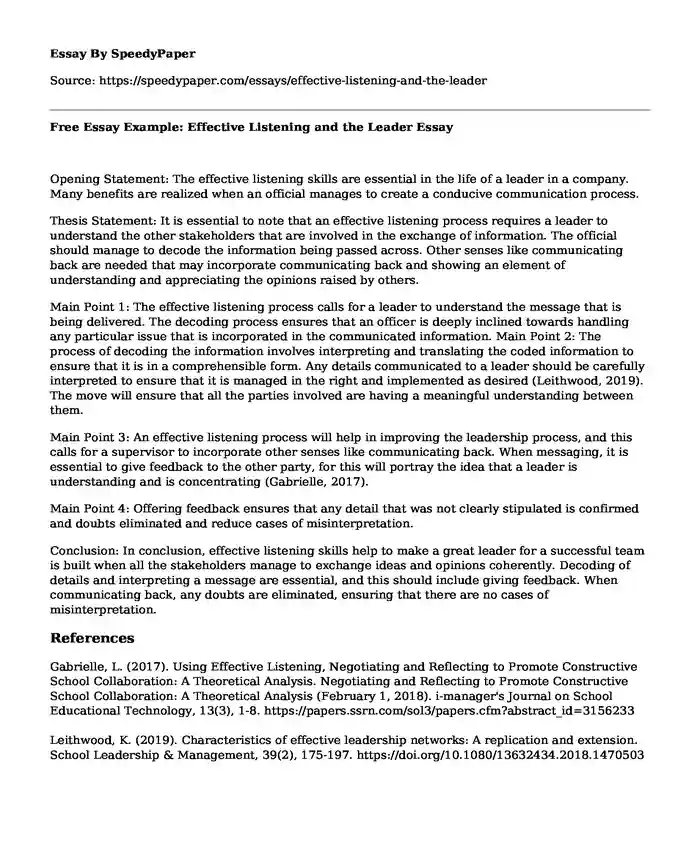
| Type of paper: | Essay |
| Categories: | Communication skills Leadership style |
| Pages: | 2 |
| Wordcount: | 398 words |
Opening Statement: The effective listening skills are essential in the life of a leader in a company. Many benefits are realized when an official manages to create a conducive communication process.
Thesis Statement: It is essential to note that an effective listening process requires a leader to understand the other stakeholders that are involved in the exchange of information. The official should manage to decode the information being passed across. Other senses like communicating back are needed that may incorporate communicating back and showing an element of understanding and appreciating the opinions raised by others.
Main Point 1: The effective listening process calls for a leader to understand the message that is being delivered. The decoding process ensures that an officer is deeply inclined towards handling any particular issue that is incorporated in the communicated information. Main Point 2: The process of decoding the information involves interpreting and translating the coded information to ensure that it is in a comprehensible form. Any details communicated to a leader should be carefully interpreted to ensure that it is managed in the right and implemented as desired (Leithwood, 2019). The move will ensure that all the parties involved are having a meaningful understanding between them.
Main Point 3: An effective listening process will help in improving the leadership process, and this calls for a supervisor to incorporate other senses like communicating back. When messaging, it is essential to give feedback to the other party, for this will portray the idea that a leader is understanding and is concentrating (Gabrielle, 2017).
Main Point 4: Offering feedback ensures that any detail that was not clearly stipulated is confirmed and doubts eliminated and reduce cases of misinterpretation.
Conclusion: In conclusion, effective listening skills help to make a great leader for a successful team is built when all the stakeholders manage to exchange ideas and opinions coherently. Decoding of details and interpreting a message are essential, and this should include giving feedback. When communicating back, any doubts are eliminated, ensuring that there are no cases of misinterpretation.
References
Gabrielle, L. (2017). Using Effective Listening, Negotiating and Reflecting to Promote Constructive School Collaboration: A Theoretical Analysis. Negotiating and Reflecting to Promote Constructive School Collaboration: A Theoretical Analysis (February 1, 2018). i-manager's Journal on School Educational Technology, 13(3), 1-8. https://papers.ssrn.com/sol3/papers.cfm?abstract_id=3156233
Leithwood, K. (2019). Characteristics of effective leadership networks: A replication and extension. School Leadership & Management, 39(2), 175-197. https://doi.org/10.1080/13632434.2018.1470503
Cite this page
Free Essay Example: Effective Listening and the Leader. (2023, Nov 15). Retrieved from https://speedypaper.com/essays/effective-listening-and-the-leader
Request Removal
If you are the original author of this essay and no longer wish to have it published on the SpeedyPaper website, please click below to request its removal:
- Free Essay on Interpersonal Communication and Human Relationships
- Essay Example: Women in Leadership and Social Change
- Free Essay Sample - Becoming an Exceptional Leader
- Essay Sample on Leadership Styles and Models Management
- Green Marketing Product Strategy. Free Essay
- Paper Example on Organizational and Systems Leadership: Assessment Tool
- Free Essay Sample: Translation as Intercultural Communication
Popular categories




